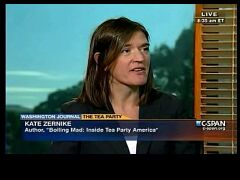Zernike Strikes Again: 'Emotion Outweighs Fact' Among Tea Party Hypocrites
Kate Zernike, the Times reporter whose keen ear overheard a "Chris Rock voice" from a Brooklyn conservative at a political gathering in D.C. last month, profiled a Tea Party group in Indiana for Sunday's front page and uncovered hypocrisy in a movement that puts angry emotionalism over facts: "With No Jobs, Plenty of Time For Tea Party."
From the start, Zernike implied hypocrisy on the part of Tea Partiers who call for limited government yet also take advantage of government insurance programs:
When Tom Grimes lost his job as a financial consultant 15 months ago, he called his congressman, a Democrat, for help getting government health care.
In the last year, he has organized a local group and a statewide coalition, and even started a "bus czar" Web site to marshal protesters to Washington on short notice. This month, he mobilized 200 other Tea Party activists to go to the local office of the same congressman to protest what he sees as the government's takeover of health care.
Mr. Grimes is one of many Tea Party members jolted into action by economic distress. At rallies, gatherings and training sessions in recent months, activists often tell a similar story in interviews: they had lost their jobs, or perhaps watched their homes plummet in value, and they found common cause in the Tea Party's fight for lower taxes and smaller government.
The Great Depression, too, mobilized many middle-class people who had fallen on hard times. Though, as Michael Kazin, the author of "The Populist Persuasion," notes, they tended to push for more government involvement. The Tea Party vehemently wants less - though a number of its members acknowledge that they are relying on government programs for help.
The Times emphasized the alleged hypocrisy in a photo caption from a Tea Party rally in Sen. Harry Reid's hometown: "Tea Party supporters, many of whom argue for smaller government even as they argue it should do more, rallied Saturday in Searchlight, Nev., Senator Harry Reid's hometown."
The fact that many of them joined the Tea Party after losing their jobs raises questions of whether the movement can survive an improvement in the economy, with people trading protest signs for paychecks.
Given that unemployment is the default position for many left-wing protesters (which partly explains how the left can gin up large gatherings on weekdays on short notice), isn't it suspect for Zernike to uniquely focus on unemployed conservative protesters?
Zernike allowed Tea Party organizer Diana Reimer to explain:
She and others who receive government benefits like Medicare and Social Security said they paid into those programs, so they are getting what they deserve.
Zernike jumped on an isolated quote to suggest Tea Partiers lack the facts:
[Tea Party organizer Jeff McQueen] and others do not see any contradictions in their arguments for smaller government even as they argue that it should do more to prevent job loss or cuts to Medicare. After a year of angry debate, emotion outweighs fact.
"If you don't trust the mindset or the value system of the people running the system, you can't even look at the facts anymore," Mr. Grimes said.
Tea Party groups like FreedomWorks recognize that they are benefiting from the labor of many people who have been hit hard economically. But its chairman, the former House majority leader Dick Armey, argued that their ranks will remain strong - and connected - even as members find work.



